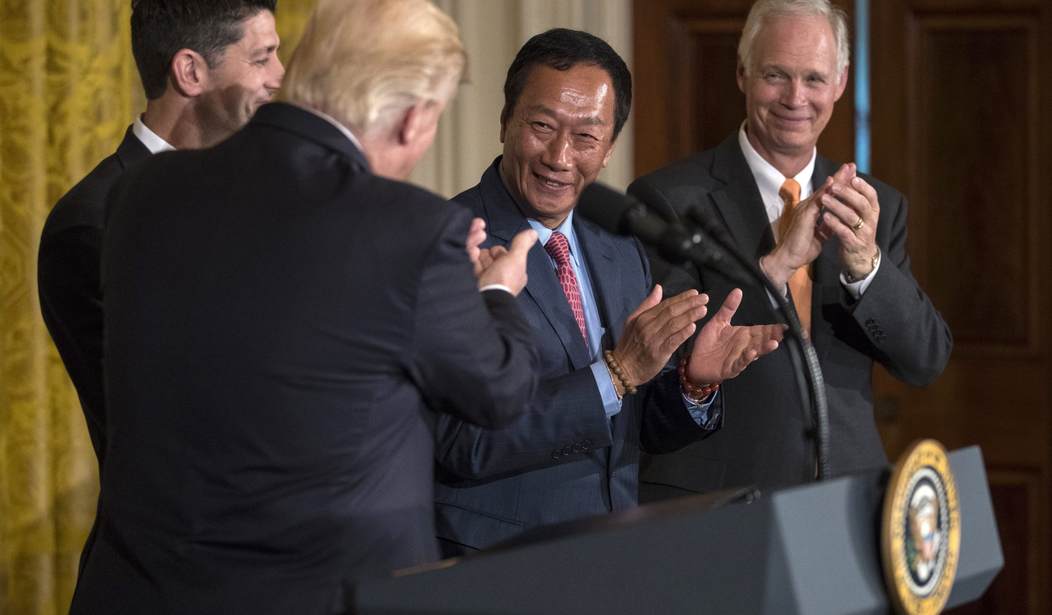Michael D. LaFaive, senior director of Fiscal Policy at the Mackinac Center, told PJM Wisconsin should run, not walk, away from the Foxconn deal.
Wisconsin Senate Democrats do want a better deal than the $3 billion economic development package President Trump has taken credit for hammering out with Foxconn, a Taiwan-based Apple supplier that has promised to create thousands of jobs in Racine, Wis.
In exchange for the $3 billion in tax credits and other incentives, Foxconn has agreed to build a $10 billion LCD panel factory in House Speaker Paul Ryan’s (R-Wis.) district. The company has also promised to create between 3,000 and 13,000 jobs.
The Republican-dominated Wisconsin Assembly swiftly approved the Foxconn package in less than three weeks.
Democrats hope they can at least slow down the Foxconn train as Senate debate began Tuesday with a Senate Joint Finance Committee hearing.
Senate Democratic Leader Jennifer Shilling is afraid state taxpayers “could be on the hook” for tax credits worth up to $1.5 million per job if Foxconn creates and retains 1,000 jobs over 15 years.
“We need to make sure Wisconsin taxpayers aren’t being taken for a ride,” said Shilling.
Opposition to the Foxconn package is more than a case of Wisconsin Democrats trying to stop a plan endorsed by both Trump and Republican Gov. Scott Walker.
Timothy Bartik, an economist with the W.E. Upjohn Institute for Employment Research, told CNN if 13,000 people do find new employment at the Foxconn plant, the cost per job would be between $15,000 and $19,000 per job.
That is well below Shilling’s $1.5 million cost-per-job estimate. But Bartik said it would still be six times higher than the typical cost per job in similar economic development packages.
Michael LaFaive said the Foxconn package is more than a bad bargain. He argued it was just bad policy.
“There is no good reason for a multi-national corporation to be subsidized at such great expense of everyone else in the state, particularly low-income people,” LaFaive said.
“I wonder what it is like to walk in their shoes and grind out a living while seeing multi-national corporations get special deals that probably don’t create net new jobs for the people of Wisconsin, but benefit a favored few,” LaFaive added.
Even the conservative Americans for Prosperity, a group that has always been in Walker’s corner, has come out against the Foxconn deal.
“As much as we believe in Governor Walker’s agenda that has turned this state around, as free-market activists who staunchly oppose government tax incentives,” said Americans for Prosperity Wisconsin state director Eric Bott.
“We cannot support the expensive refundable tax credits in this package, which are not available to every other business in our state,” said Bott.
However, Trump – who claimed credit for personally negotiating the package – and Gov. Walker have called the agreement a victory for manufacturing in Wisconsin and the U.S.
The Chicago Tribune reported that Walker said Foxconn could mean as much to Wisconsin’s economy as the Green Bay Packers’ signing of Reggie White meant to the team’s drive to win a Super Bowl.
Not be outdone on the field of hyperbole, Republican Rep. Dale Kooyenga compared the Wisconsin Legislature’s approval of the Foxconn package to Thomas Jefferson’s Louisiana Purchase.
Assuming all goes as Trump and Walker expect, the Foxconn plant would be built between Racine and Kenosha.
Racine Mayor Dennis Wiser isn’t sure it will be good for his town.
“There [are] so many unknowns,” Wiser told the Chicago Tribune. “People are a bit perplexed.”
As mayor of Racine, Wiser has to worry about mandate matters like how much it would cost to expand water and sewer systems to serve the new Foxconn plant.
Wiser admitted the “potential for jobs is enormous,” but he also is concerned about the possibility that some, or even many, of those jobs, could go to people across the border in neighboring Illinois.
LaFaive said Wiser should worry about losing jobs to Illinois.
“It wouldn’t surprise me that a bedroom community in Illinois provided employees to the Racine project. I have seen this in other border localities,” said LaFaive. “It is just one more reason that everyone should be suspect of deals that transfer money from the many to the few.”
Even if Foxconn builds a $10 billion factory and creates 13,000 jobs, the Wisconsin Legislature Fiscal Bureau estimated it would take at least 25 years for the state to break even on the $3 billion incentive package.
If some of those jobs never materialize or go to people from outside Wisconsin, the report said the break-even point would go “well past” 25 years.
And here’s another concern: CNBC reported the agency in charge of verifying Foxconn’s employment reports has a history of “failing to verify job-creation claims.”
A May audit found the Wisconsin Economic Development Corporation did not independently verify jobs numbers that tax credit recipients claimed to create. The review showed the WEDC also took no action against the companies that failed to meet job creation targets.
One business was allowed to keep tax credits valued at $1.4 million. The WEDC forgave combined loans of $1 million to two other companies that missed job targets.
Wisconsin Legislative Audit Bureau reports from 2013 and 2015 showed similar problems with WEDC oversight.
Wisconsin Economic Development Corporation spokesman Mark Maley said the WEDC would hire more staff to handle the Foxconn project should it be approved by the Wisconsin Legislature.
State Sen. Jon Erpenbach said he has concerns with the Foxconn deal that go beyond holding the company accountable for job creation.
“Wisconsin needs to be able to at least try to take on Foxconn if they damage our environment and our economy,” said Erpenbach.
“Foxconn is not a Wisconsin company building their future here,” Erpenbach added. “They are a Taiwanese company looking to avoid President Trump’s tariff threats, and we are just the state with the best deal for them.”









Join the conversation as a VIP Member